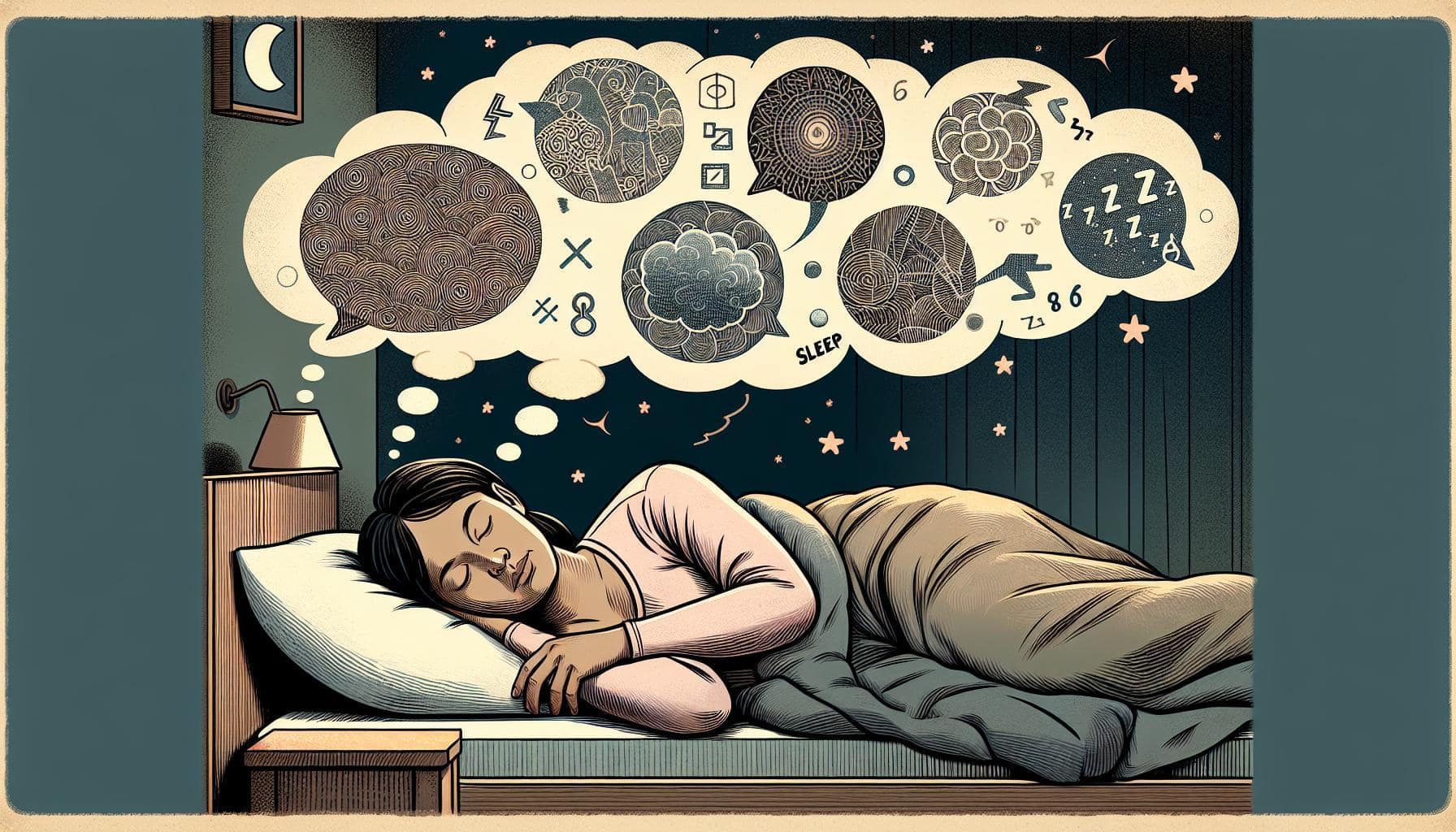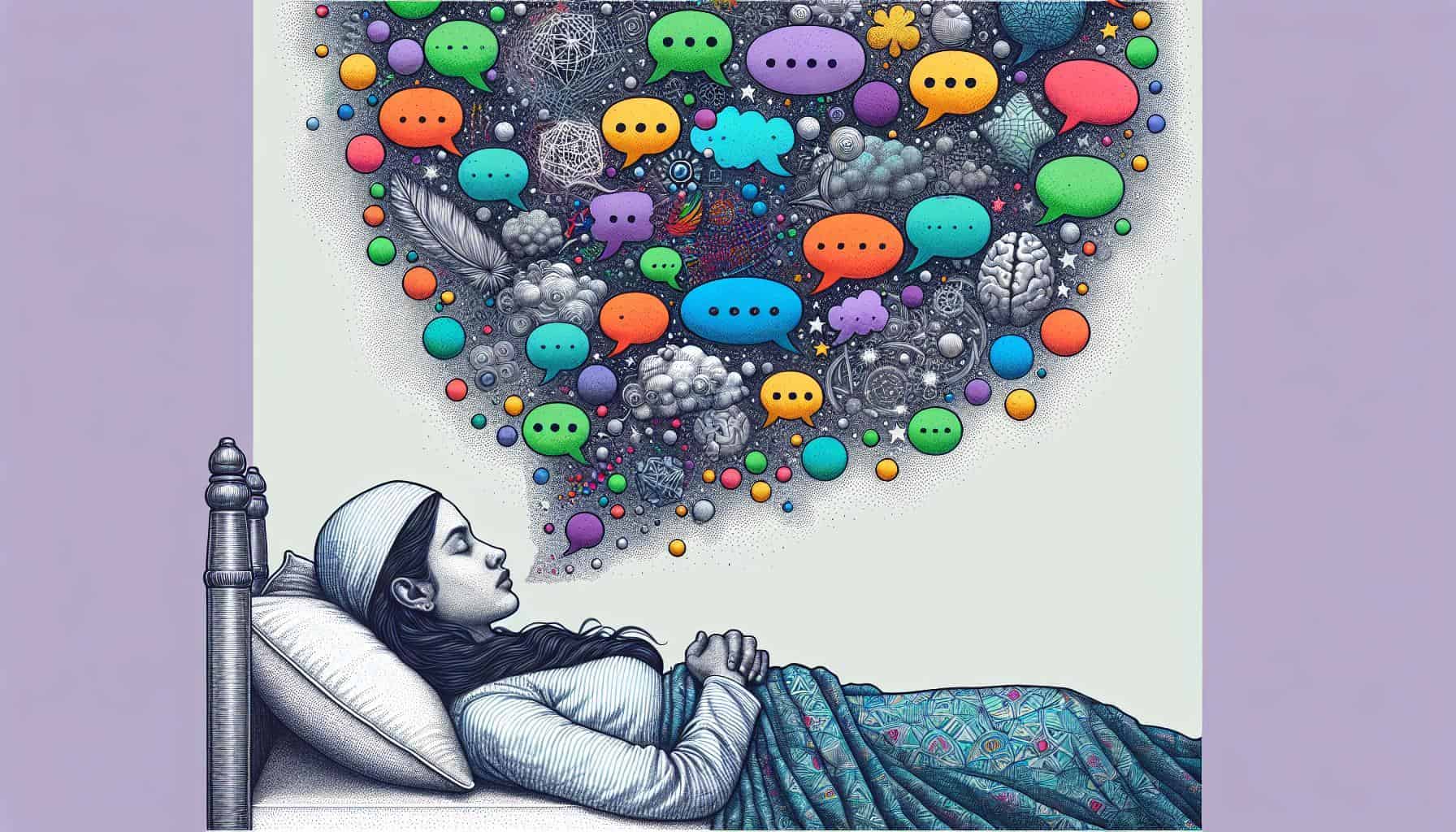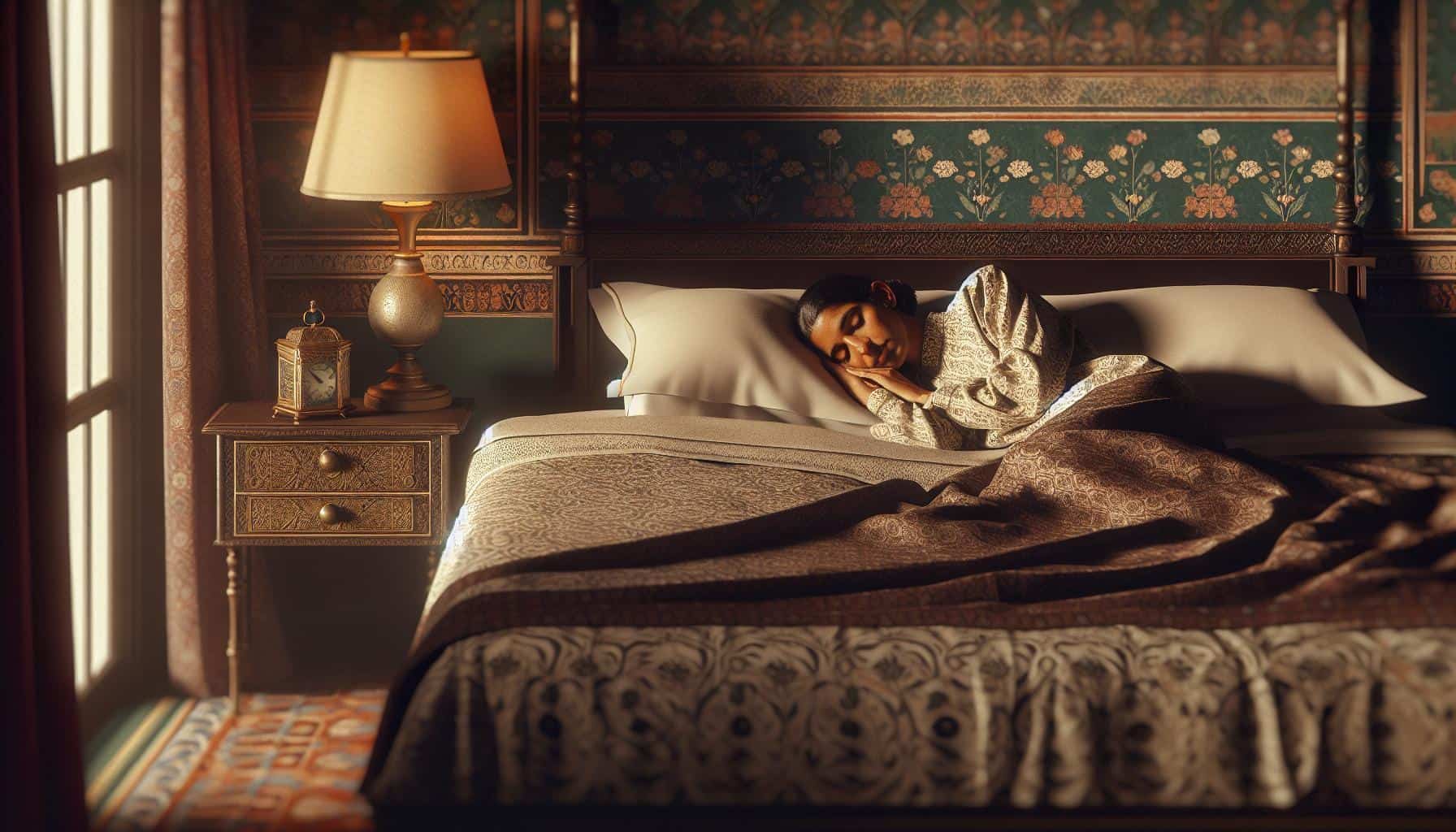Why People Talk In Their Sleep And How To Manage It (2024)
Ever found yourself waking up to your own voice or been told you’re quite the chatterbox while catching Z’s? You’re not alone. Sleep talking, or somniloquy, is a sleep disorder that finds a surprising number of us talking, mumbling, or making sounds in our sleep—about 67% of people, to be exact.
This nighttime nattering can be amusing, baffling, and sometimes embarrassing. But what’s behind these mysterious midnight monologues? While it’s a common phenomenon among both adults and children, the exact reasons why people talk in their sleep remain a bit of a puzzle.
The Definition of Sleep Talking
As you delve into the quirks of human sleep behavior, you’ll find that sleep talking, or somniloquy, is a sleep disorder with a wide array of vocal expressions. Experts like Ford, highlight that while somniloquy primarily involves spoken words, it’s not limited to just clear speech. Rather, it encompasses a range of auditory experiences from laughable comments to nonsensical mutterings. It’s crucial to note that other vocal sounds such as laughing, crying, and moaning, typically aren’t classified as sleep talking.
Based on reports from participants in sleep talking surveys, you can see the diverse nature of this phenomenon:
- Unintelligible or incoherent speech: 68%
- Nonsensical phrases: 49%
- Laughing: 24%
- Humorous comments: 23%
- Mentioning specific persons or situations: 22%
- Scary comments: 9%
- Cursing: 8%
This breadth of sleep utterances might leave you wondering how somniloquy fits within the broader category of sleep disorders.
Sleep specialists still grapple with the nuances that demarcate sleep talking. Some studies draw a distinction between nonverbal utterances and understandable words, yet often, these two are filed under the broad umbrella of sleep talking.
Despite its humorous or unsettling content, sleep talking is typically viewed as a benign quirk of your night-time neurology. That said, occasional sleep talking is fairly common, affecting about 5% of adults and up to 50% of young children. It’s interesting to note that it’s not just words; diverse and unpredictable vocal occurrences underscore the unpredictable nature of sleep talking.
Understanding the specific characteristics of sleep talking is crucial for distinguishing it from other sleep-related phenomena such as REM Sleep Behavior Disorder, where people physically act out their dreams. In contrast to the loud, clear-cut sounds of sleep talking, disorders like REM Sleep Behavior Disorder lead to more hazardous situations, with the sufferer not paralyzed during the REM stage, raising the stakes for physical activity during sleep.
Prevalence of Sleep Talking
 When you’re tucked in your bed at night, you might be more vocal than you think. Sleep talking is a fascinating phenomenon that affects a significant portion of the population. It doesn’t discriminate much between adults and children, with about 5% of adults and up to 50% of young children experiencing it. Nonetheless, uncovering the full extent of its prevalence remains tricky, as many might not even be aware that they’re churning out words in their sleep.
When you’re tucked in your bed at night, you might be more vocal than you think. Sleep talking is a fascinating phenomenon that affects a significant portion of the population. It doesn’t discriminate much between adults and children, with about 5% of adults and up to 50% of young children experiencing it. Nonetheless, uncovering the full extent of its prevalence remains tricky, as many might not even be aware that they’re churning out words in their sleep.
Gaining insights into the scope of this issue is further complicated by the co-occurrence of somniloquy with other parasomnias, which can mask or intertwine with sleep talking events. For those lying in bed next to a sleep-talker, the episodes are often fleeting. Most outbursts consist of random words or nonsensical sentences rather than elaborate discourse. But just because these moments are short doesn’t mean they’re rare.
A notable point here is that sleep talking can happen at any stage of sleep, setting it apart from other sleep disturbances that are usually specific to either REM or non-REM stages. This implies that somniloquy could be taking place throughout the night’s cycle, possibly more often than one might expect.
Stage of Sleep | Unique Characteristics | Potential for Sleep Talking |
|---|---|---|
REM | Vivid dreaming, muscle atonia | Yes |
Non-REM | Light to deep sleep, physiological rest | Yes |
Moreover, it’s not just the frequency but also the content of sleep talking that raises eyebrows. Elements of the speech can range from mundane to explicit, with a study revealing that nearly 60% of vocalizations are nonverbal sounds. Interestingly, the use of swear words was more common during non-REM sleep, while verbal abuse lasted longer and was more complex during REM sleep.
Understanding why people talk in their sleep is as much about the words they utter as the frequency with which they do so. What this data hints at is the intricacy of the human brain even when it’s ostensibly resting, and the variety of interactions that different sleep stages can produce with our vocal cords.
The Different Types of Sleep Talking
 When you’re trying to grasp the nuances of sleep talking, it’s essential to recognize the range it spans. Because sleep talking, or somniloquy, isn’t extensively researched, there’s a bit of variety in how it’s categorized, yet some patterns emerge from the studies available. Sleep talking encompasses a wide array of verbal activity during sleep, and it’s not just about words but also about the type of vocalization.
When you’re trying to grasp the nuances of sleep talking, it’s essential to recognize the range it spans. Because sleep talking, or somniloquy, isn’t extensively researched, there’s a bit of variety in how it’s categorized, yet some patterns emerge from the studies available. Sleep talking encompasses a wide array of verbal activity during sleep, and it’s not just about words but also about the type of vocalization.
Participants in various surveys have described their experiences, shining a light on the varied nature of sleep talking. Here’s how it breaks down, based on a recent survey:
- Unintelligible or incoherent speech: 68%
- Nonsensical phrases: 49%
- Laughing: 24%
- Amusing or humorous comments: 23%
- A specific person or situation: 22%
- Scary comments: 9%
- Cursing: 8%
These categories underscore that sleep talk can range from the mundane to the complex, with a majority experiencing speech that isn’t easily understood. Yet, a surprising variety also bring a touch of humor or even angst to their nighttime narratives.
Beyond content, sleep talking varies with sleep stages. In the lighter Stages 1 to 3 of sleep, you might notice someone having what sounds like a coherent conversation or monologue. As sleep deepens, their words may become less clear, devolving into mumbles or garbled sentences. Then, during Stage 4 or REM sleep, this nighttime chatter can become more vivid and complex.
Interestingly, while sleep talking itself doesn’t seem to affect the sleeper’s rest, it can have a surprising effect on those nearby. It’s often the bed partners who bear the brunt of disrupted sleep due to these nocturnal outbursts. So if you’re concerned about the impact of sleep talking on someone else’s sleep, considering lifestyle changes or refining your sleep hygiene can go a long way to ensuring everyone gets the rest they need.
The Causes of Sleep Talking
Ever wondered why some people talk in their sleep? This behavior, commonly known as sleep talking or somniloquy, can be traced back to a variety of causes. It’s important for you to understand these triggers, especially if you or a loved one is experiencing it frequently.
First and foremost, genetics plays a crucial role. If you find yourself muttering in your sleep, chances are your parents did too. Interestingly, research indicates a strong hereditary link with this phenomenon.
Moreover, mental health conditions can fuel sleep talking. Those with post-traumatic stress disorder (PTSD), depression, and anxiety seem particularly prone to it. In the realm of dreams, sleep talking often accompanies nightmares, which are more common in children but can also be present in adults dealing with mental stress or trauma.
Beyond mental health, medications and substances can have an impact. Certain drugs, like antidepressants, heighten muscle activity during REM sleep, which can lead to an increase in parasomnias such as sleep talking and sleepwalking. Likewise, alcohol has been identified as a substance that amplifies the likelihood of talking during sleep, emphasizing the influence that lifestyle choices have on your nightly rest.
Interestingly, fever can also spark sleep talking episodes. High body temperatures affect brain function and can make a person more susceptible to unleashing words while slumbering.
Other sleep disorders hand-in-hand with sleep talking include sleepwalking and teeth grinding – both might reflect an underlying disruption in your sleep that warrants attention.
If you notice that your nighttime narratives are becoming more frequent or worrying, consider these factors as potential catalysts. Mind your sleep hygiene and watch for patterns that might be exacerbating the issue. Remember, while sleep talking is generally harmless, it’s a sign from your body that shouldn’t be ignored.
The Relationship between Sleep Talking and Sleep Disorders
When delving into sleep disorders, it’s evident that sleep talking doesn’t just happen in a vacuum. It often walks hand-in-hand with other sleep-related conditions that could hint at a deeper issue.
Comorbid Sleep Conditions
If you’re conversing in the wee hours without recollection, you might be experiencing what’s known as a parasomnia—a category of sleep disorders disrupting the sleep stages. Sleep talking can pair with various conditions such as:
- Dementia
- Parkinson’s Disease
- Posttraumatic Stress Disorder (PTSD)
- Epileptic Seizures
- Obstructive Sleep Apnea
In individuals with PTSD, particularly veterans, parasomnias like REM sleep behavior disorder are more prevalent. Interestingly, those with psychiatric conditions may encounter sleep talking twice as frequently compared to those without these diagnoses.
The Impact of Sleep Disorders on Sleep Talking
The interaction between sleep talking and other sleep disorders is quite significant. Reflecting on the association with medical conditions like dementia and Parkinson’s disease, it encapsulates a spectrum ranging from cognitive decline to motor symptoms affecting sleep quality.
PTSD and Sleep Disruptions
With PTSD, the nightmares and vivid dreaming experienced during REM sleep can activate sleep talking. The table below highlights the comparative frequency of this phenomenon:
Condition | Frequency of Sleep Talking |
|---|---|
PTSD and other psychiatric conditions | Twice as high |
Absence of psychiatric conditions | Lower frequency |
The disruption of sleep due to these spoken outbursts affects not just the sleeper but also their bed partner, potentially leading to increased daytime sleepiness for both parties.
Always remember that the content of sleep talking is beyond your control, sometimes giving voice to personal matters that could sway relationships. If late-night chatter becomes a cause for concern or if it’s a new occurrence as an adult, it might be wise to consult a somnologist for a thorough evaluation.
Navigating through the complexities of these nocturnal conversations can illuminate underlying health challenges and pave the way for better sleep health.
The Impact and Effects of Sleep Talking
When you’re dealing with sleep talking, it’s not just about the quirky midnight rants; the effects can be far-reaching. Delving beyond the surface, you’ll find that sleep talking is more than a benign nighttime disturbance—it’s often enmeshed with various sleep disorders that compound the impact on your health.
Cognitive Behavioral Therapy (CBT), for instance, has been highlighted as a beneficial approach for those who are wrestling with related sleep issues. For sleep talkers and their partners, studies show that engaging in CBT can lead to markedly improved sleep quality. The focus here is on recalibrated thought patterns and behavior, which can indirectly lessen sleep talking episodes.
But let’s talk about the immediate effects, especially for bed partners and roommates. There’s the obvious disruption of your sleep—earplugs and white noise machines have become staple remedies for this exact situation. However, in some cases, a more drastic measure, known as “sleep divorce,” has prevailed as a solution for uninterrupted sleep. It’s not a euphemism for couples heading to splitsville, but rather a practical arrangement where partners choose to sleep in separate rooms to maintain their health and happiness.
The question of whether sleep talking can be physically harmful takes center stage when examining its effects. Alone, it’s typically harmless banter, but paired with a condition like REM behavior disorder, the risk of injury from acting out dreams becomes a tangible concern.
Moreover, it’s essential to differentiate sleep talking from conditions that seem identical. Take nocturnal epilepsy or catathrenia, for instance; these disorders mimic sleep talking but have distinct health implications and therefore require different therapeutic approaches.
Lastly, the shadow of stress as a contributing factor to sleep talking can’t be overlooked. While the evidence isn’t conclusive, there’s a connection between stress, particularly in children and individuals with PTSD, and the frequency of sleep talking. This insight nudges us toward understanding the psychological undertones of sleep-related vocalizations.
Tips for Managing and Preventing Sleep Talking
 Navigating the world of sleep talking can be perplexing, especially since it’s often linked with underlying sleep disorders. Yet, knowing the right strategies can prove beneficial for you and your bed partner. Establishing excellent sleep hygiene and addressing stress are critical steps.
Navigating the world of sleep talking can be perplexing, especially since it’s often linked with underlying sleep disorders. Yet, knowing the right strategies can prove beneficial for you and your bed partner. Establishing excellent sleep hygiene and addressing stress are critical steps.
Creating an ideal sleeping environment can significantly reduce incidents of sleep talking. A dark, cool, quiet bedroom promotes deeper sleep, lessening the chances of sleep disturbances. Ensuring your pre-sleep routine is calming and consistent every night helps signal to your body that it’s time to wind down.
Avoid stimulants like caffeine and alcohol, both of which can negatively impact your sleep cycle. Cutting out these substances several hours before bedtime may prevent disruptions that could lead to sleep talking. Heavier meals are also notorious for causing discomfort and should be avoided.
Here are some tailored tips to enhance your sleep hygiene:
- Ensure your bedroom is solely a place for sleep and intimacy.
- Limit naps during the day to maintain a regular sleep pattern.
- Establish a relaxing bedtime routine, perhaps incorporating reading or meditation.
- Limit screen time an hour before bed to reduce exposure to blue light.
If your sleep talking is symptomatic of a sleep disorder, treatment for the disorder might also alleviate your sleep talking. Actions like Cognitive Behavioral Therapy (CBT) not only improve overall sleep quality but can also increase sleep intensity. This in turn may eliminate the lighter stages of sleep where sleep talking is more likely to occur.
Remember, finding a successful strategy to manage or prevent sleep talking is a personal journey. What works for one might not work for another. Therefore, it’s important to monitor your sleep patterns and consult with a sleep specialist if needed. These professionals can offer tailored advice and treatment options to tackle your particular situation.
Conclusion
You’ve got the tools to tackle sleep talking head-on. Remember, it’s all about creating a serene sleep sanctuary and keeping stress at bay. Stick to your calming bedtime rituals and steer clear of those late-night espressos and nightcaps. If your nighttime narratives persist, don’t hesitate to seek out a sleep specialist. They’re the experts who can dive deep into your sleep patterns and offer solutions tailored just for you. Sleep talking doesn’t have to be a solo act—you’ve got support to turn those nighttime monologues into silent nights. Sweet dreams!
Frequently Asked Questions
What does it mean when you laugh in your sleep?
Laughing during sleep, known as sleep-laughing, is typically a normal response to dreams. It’s considered harmless but can sometimes indicate neurological disorders.
Why do people moan in their sleep?
Moaning during sleep, called catathrenia, can disturb sleep partners. Its exact causes are unclear, but it may be linked to respiratory or airway issues. Treatments include CPAP therapy and surgery.
Should I be worried if I talk in my sleep?
Sleep talking usually isn’t worrisome, but if it starts suddenly in adulthood, it could signal an underlying health condition. Consult a doctor if it’s a new occurrence.
What causes someone to talk in their sleep?
Mental health issues and conditions such as PTSD, depression, and anxiety are common causes of sleep talking. In children, it may coincide with nightmares.
What is the spiritual meaning of sleep talking?
Some believe sleep talking allows the subconscious mind to convey messages ignored during wakefulness, granting it a spiritual dimension.

